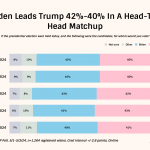Vance’s 2022 Senate campaign was so alienating to progressives, and so helped by Donald Trump’s intervention, that Democrats were caught off guard by his eagerness to co-sponsor legislation.
“We hear from the same people. We’re working on this together. We have very few differences on it, almost none,” said Brown, Vance’s co-sponsor on rail safety. “His most important job, in my opinion, is to deliver 15 or so Republicans here.”
That job requires him to speak MAGA in the conservative media world, where Vance has been an eager attack dog. His collaboration with Brown began even after he’d taken a prominent role bashing President Biden’s response to the rail disaster and complaining that the administration was “talking about how we have too many white-male construction workers” instead of fixing it.
The railway safety bill has gotten most of the attention; it’s got the best and earliest chance of passage. But Vance has also joined forces with Minnesota Sen. Amy Kobuchar on preventing catalytic converter theft; with Massachusetts Sen. Elizabeth Warren on getting guardsmen and reservists earlier access to healthcare; with Arizona Sen. Mark Kelly on speeding up manufacturing starts in rural areas; and with Warren, again, on clawing back executive compensation when banks fail.
“We actually want to make change,” Warren told Politico earlier this month, explaining the collaboration with Vance.
The presidential campaign so far — its race to the right, its all-absorbing debates about Trump — hasn’t impacted any of this. Senators who’ve worked with Vance told Semafor that his pro-Trump nominee blockade wasn’t an impediment to working with him.
“When people go through the weekly, monthly work we’ve got to do here, we learn to work together,” said Sen. Bob Casey, D-Pa.
Negative coverage of what Vance is trying to do, from the left, wasn’t impacting it either. Brown pushed back against a Lever News story that linked the American Chemistry Council’s support for the bill to its lobbying to push back the timeline for requiring safer tank cars. “It’s a little bit like MPG standards in cars,” Brown said. “As much as I wanted to accelerate that, you can’t do it that quickly.”
But Vance’s long-term project is building a more populist right, led in the short term by Trump, and using the state’s power in ways that sometimes overlap with the progressive movement. The left wants universal healthcare; he wants free healthcare for mothers and babies.
“We have to figure out a way to — for political reasons — convince people that we’re pro-life not just until the moment the baby’s born, and — for moral reasons — actually have to make it easier to have children and raise families in this country,” Vance said. That didn’t mean the “back-door single-payer” that progressives might want. The compromise could come through currently existing insurance: “If you’re required to provide contraception, you should be required to provide healthcare to the people who decide to have the kid.”
It’s an open question how many votes Vance can deliver from his own side for his proposals — his work on the rail bill has drawn dismissive coverage in National Review and opposition from Sen. Ted Cruz. Trump himself has never been too drilled in on policy specifics and the budget-slashing House Freedom Caucus is ascendant again (that’s less of an impediment, said Vance, than the “Chamber of Commerce” wing of the party). Skeptics still question if Vance’s brand of conservatism is a passing quirk rather than a preview of what’s to come.
“Maybe this model doesn’t work for six years,” Vance said. “But for six months, the model of fighting for conservative principles while working to get some things done haven’t been in tension. They’ve actually been in harmony.”

